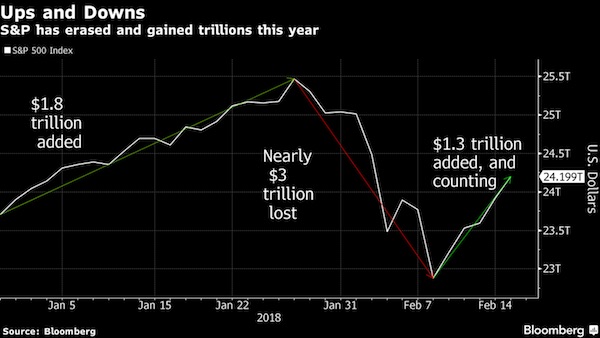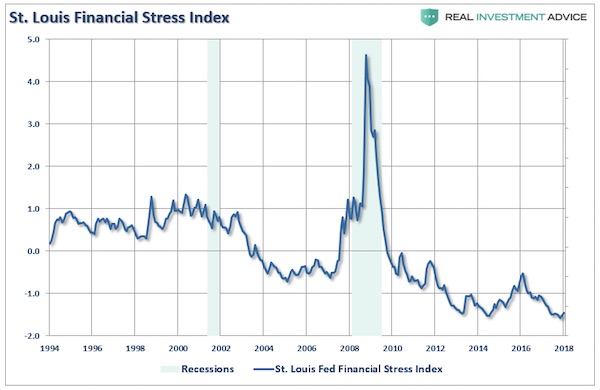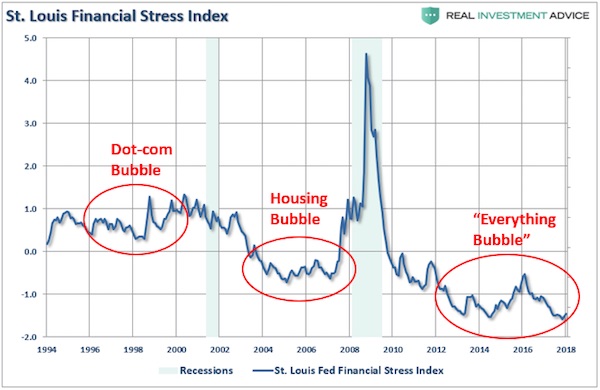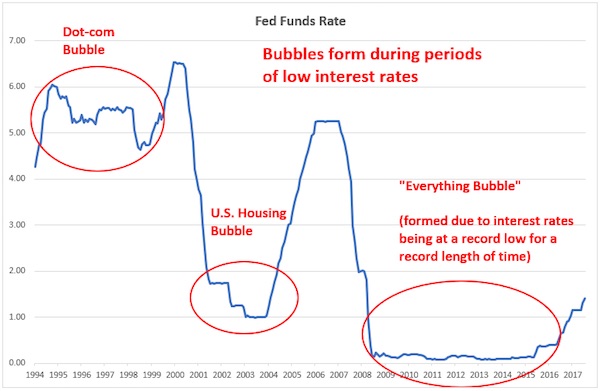
Pablo Picasso Self portrait 1919

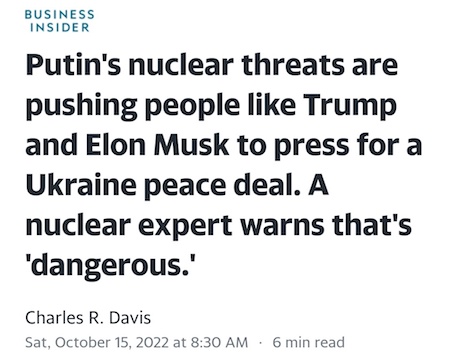



Halloween
I made a horror film for Halloween. It's short but scary. pic.twitter.com/xBbyzd6bIL
— Maze (@mazemoore) October 16, 2022

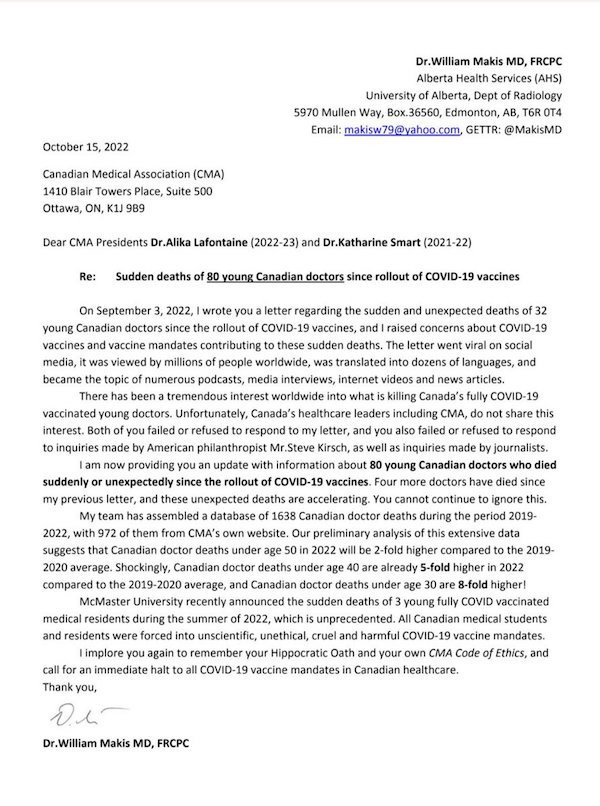

Fauci
Jon Karl: "What's the biggest misconception about you?"
Fauci: "I think misconception is that i was misleading people. For somebody to say that, you know, I'm 'political,' I mean that's completely crazy."
Source: https://t.co/MS2VGZfXTq pic.twitter.com/xPyz470iP1— Wittgenstein (@backtolife_2023) October 16, 2022

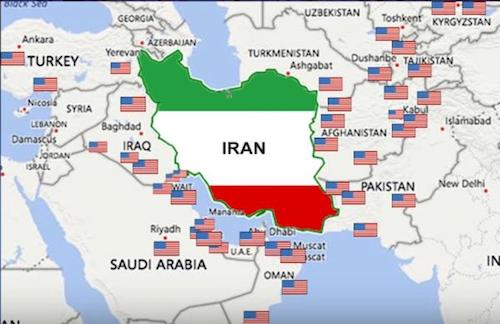
Iran hasn’t invaded a country in 300 years, yet we, the United States, being 246 years old, have been at war for 236 years.

Tedros
https://twitter.com/i/status/1581732938957443098

The universe contains more planets than seconds that have passed since the Big Bang 13.8 billion years ago.


The consequences have been known for months: NO GAS. And also:
“..Russian Deputy Prime Minister Aleksander Novak said the US should set a price cap on its own liquified natural gas (LNG) going to Europe..”
I think if serious peace talks don’t start within a month, it’s too late to stop the cold, the hunger, and the resulting riots.
• Gazprom Outlines Consequences For Price Cap On Russian Gas (RT)
Plans to set a price cap on Russian gas sales, which are currently being considered by Western leaders, would cause supplies to be halted, according to Gazprom CEO Alexey Miller. “We rely on the contracts that have been signed. A unilateral decision of the kind is, of course, a violation of essential terms of the agreements which would lead to a termination of supplies,” Miller said on Sunday in an interview with Russia 1 TV. Numerous sanctions have been introduced by the US, EU, and allies on Moscow over its military operation in Ukraine. EU customers have so far reduced their purchases of Russian energy, and the G7 and EU are currently trying to introduce a price cap on Russia’s oil and gas.
Miller’s comments echoed a similar warning from President Vladimir Putin, who said last month that Moscow would cut off energy supplies if price caps are imposed. Earlier this month, EU leaders reached an agreement to impose yet another package of sanctions on Russia, including banning maritime transportation for Russian oil to third-party countries unless the oil is sold below or at a certain price. The measures would take effect after December 5, 2022 for crude and February 5, 2023 for refined petroleum products.
Earlier this week, US Treasury Secretary Janet Yellen said that a price cap on Russian oil exports of around $60-per-barrel would likely reduce Moscow’s energy revenues while allowing profitable production, thus keeping Russian crude on the global market. Yellen stressed that the measure is still being discussed by the US and its Western allies. On Friday, Russian Deputy Prime Minister Aleksander Novak said the US should set a price cap on its own liquified natural gas (LNG) going to Europe, as American fuel is being delivered to Europe at prices four times higher than the price for domestic consumption.
In an address on Oct 12, Pres. Putin quoted Milton Friedman, “If you want to create a shortage of tomatoes, just pass a law that retailers cannot sell tomatoes for more than 2¢/lb. Instantly you will have a tomato shortage. It is the same with oil or gas.”pic.twitter.com/utOhIBUYWC
— Steve Hanke (@steve_hanke) October 16, 2022

We’ve given them so much money, might as well hand over the keys to the safe too…
• Ukraine Finance Minister To Chair IMF, World Bank Governing Boards In 2023 (R.)
The shareholders of the International Monetary Fund and World Bank on Friday selected Ukrainian Finance Minister Serhiy Marchenko as the next rotating chair of the boards of governors of both institutions in 2023. The decision, which was announced during the annual meetings of the IMF and World Bank in Washington, means that Marchenko will also chair next year’s annual meeting of the institutions, which is scheduled to be held in Morocco. Russia’s invasion of Ukraine and the war’s massive impact on the global economy have dominated this year’s meetings, with Ukrainian President Volodymyr Zelenskiy urging international donors to provide $55 billion in additional funding next year to keep his country’s economy running and fund some initial reconstruction.
World Bank President David Malpass told shareholders of both institutions on Friday that the World Bank Group had mobilized $13 billion in emergency funding for Ukraine since the war began, including grants, guarantees, and linked parallel financing from the United States, Britain, Europe and Japan. “I remain horrified by Russia’s actions and call for Russian forces to leave Ukraine,” Malpass said in his most explicit remarks on the war to date. Marchenko said his selection was unanimously approved by all governing member countries of the two global lenders, and marked the first time that Ukraine would lead the institutions since it joined 30 years ago.
The move was unanimously approved since there was no objection during the business portion of the plenary, a source close to the discussions said. Russia is a member of the institutions and could have objected, but did not. “It is a great honor to represent Ukraine” in the international financial arena, Marchenko said in a statement released by his ministry, adding that Ukraine would be able to increase its cooperation with international financial organizations and the member countries of the World Bank and IMF.

From the Putin (and Genghis Khan, Stalin, Hitler, Mao, Saddam) Eats Babies book:
• Russia Responds To UN Official’s Rape Claims (RT)
Claims made by the UN special representative on sexual violence, Pramila Patten, go “beyond the reach of reason,” Russian Foreign Ministry spokeswoman Maria Zakharova said in a statement on Sunday. Earlier this week, Patten accused Russia of employing a “deliberate” rape “strategy”as part of its military campaign in Ukraine. “One cannot even comment on P. Patten’s … words in a serious way,”Zakharova said, adding that the UN official’s conclusions were based on data that is difficult to verify, according to Patten herself. “Once again, what we are seeing is a classic ‘highly likely’ [story], which has this time reached the level of twisted imagination,” Zakharova said.
According to her, the UN official made her conclusions based on fragmentary data provided by the Independent International Commission of Inquiry on Ukraine – a group created in spring 2022 on the basis of a resolution of the UN Human Rights Council. Russia has not recognized its mandate, Zakharova added. Patten’s claims resemble those made by the former Ukrainian human rights commissioner, Lyudmila Denisova, Zakharova said. Denisova was fired from her position in late May after a no-confidence vote over her failure to perform duties such as organizing humanitarian corridors and prisoner exchanges amid the conflict between Russia and Ukraine. Later, Ukrainian media reported that most of Denisova’s allegations regarding “sexual atrocities”committed by Russian soldiers in the country had not been confirmed by Ukrainian prosecutors.
The Foreign Ministry spokeswoman’s reaction was sparked by an interview Patten gave to AFP this week, in which she claimed that sexual violence is a “deliberate tactic” and “military strategy”of Russia, aimed at dehumanizing its “victims.” She also claimed that Russian soldiers are “equipped with Viagra.” Zakharova pointed out that similar claims have been made by Western officials in the past. In 2011, the US ambassador to the UN, Susan Rice, reportedly accused then-Libyan leader Muammar Gaddafi of supplying his troops with Viagra to supposedly encourage mass rape during a conflict that broke out following a NATO-backed coup attempt which ended with the brutal murder of Gaddafi. US military and intelligence officials subsequently told NBC that there was no evidence that the Libyan military was being supplied with Viagra or engaging in systematic rape in “rebel areas.” “The West is using the same patterns in its hybrid war,” Zakharova said on Sunday, commenting on Patten’s statements.
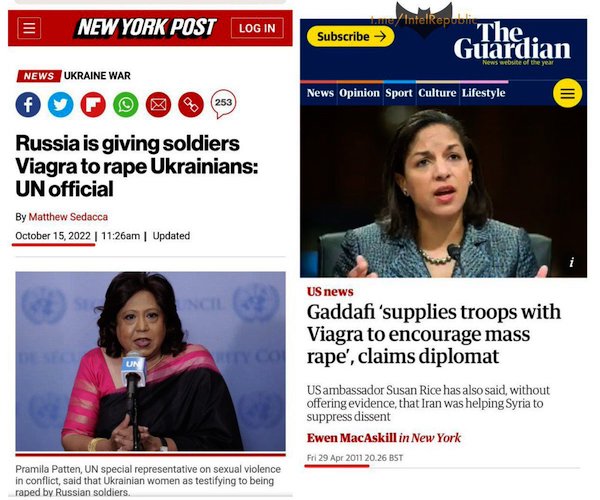

“Judging by the insane blackmail they are exposing us to…they don’t want us. The sooner we accept that they don’t want us and that we don’t belong there, the better off we will be.”
• EU Blackmails Serbia – Interior Minister (RT)
The EU’s offers to Serbia are unacceptable, and Serbs should “accept that they don’t want us,” Interior Minister Aleksandar Vulin told the Novosti news site on Saturday. He added that Belgrade should instead turn its attention to “free countries that accept us without blackmail,” such as Russia and China. “The question is not whether we want to join the EU, but whether the EU wants Serbia,” Vulin told Novosti. “Judging by the insane blackmail they are exposing us to…they don’t want us. The sooner we accept that they don’t want us and that we don’t belong there, the better off we will be.” A traditional ally of Russia, Serbia has come under intense pressure from the West to back the sanctions regime against Moscow over its military operation in Ukraine.
The European Parliament has considered freezing accession talks with Belgrade over the latter’s refusal to back its eight rounds of economic penalties, US state media reported last month, while Germany and France have offered to “accelerate” Serbia’s path to EU membership if it recognizes the independence of the province of Kosovo, Serbian President Aleksandar Vucic stated last week. For Vulin and Vucic, the answer to these offers is a clear “no.” “How much would our friends respect us if they saw us neglecting our interests in the face of enemy force?” Vulin asked. “Who would fight for us if we chose not to fight for ourselves? “Relations with Russia, China and other free countries that accept us without blackmail and conditions are the future of Serbia,” he continued.
“I believe that friendship with Russia is of the greatest importance and that without it we risk the physical disappearance of Serbia.” sAccording to a poll taken in March, some 61% of Serbs oppose any cooperation with the US-led NATO alliance, largely due to the bloc’s support for Kosovo’s independence and its 1999 bombing campaign that brought about the end of Yugoslavia. Furthermore, while Serbia applied for EU membership in 2009, accession looks to be off the table for now. The EU’s latest sanctions package targeting Russian oil exports looks set to cost Belgrade hundreds of millions of euros, Vulin said last week, describing it as the “first EU sanctions package against Serbia.” Hungary has responded to the sanctions by announcing a new pipeline to help Serbia tap into the supply of Russian crude oil.

If you live in a NATO country, you are now in a war you can’t win.
• Kremlin Speaks On NATO’s ‘De-facto’ Role In Ukraine (RT)
NATO has “de-facto become involved in the Ukraine conflict,” Kremlin spokesman Dmitry Peskov told Russia 1 TV on Sunday, adding that this will not prevent Moscow from following through with its plans and achieving its military goals in Ukraine. The Kremlin spokesman acknowledged, however, that NATO’s interference makes it “significantly harder” for Russia to conduct its operation, though it does not change the goals. “This [NATO involvements] requires… our internal mobilization in the field of economy and other spheres,” he told Russia 1, adding that there is a major difference between “the Kiev regime and… the NATO potential.” However, Russia’s own “potential allows [it] to continue the operation under such circumstances,” Peskov said.
The Kremlin spokesman provided no further details about Moscow’s plans and strategy in the military campaign, which has lasted for more than seven months. Earlier this week, Moscow denied rumors that the operation in Ukraine is being redesignated as a counter-terrorism campaign. Peskov also said at the time that there have been no decisions regarding the introduction of martial law in Russian regions which have been targeted by Ukrainian strikes in recent weeks. Moscow also denied that it has considered travel restrictions for men eligible for military service amid the continuing partial mobilization. Earlier this week, Russian President Vladimir Putin said that over 200,000 reservists have been called up, most of which are still undergoing training, while adding that the draft will be completed in around two weeks.
Jimmy Dore
Jimmy Dore says US/NATO are using the people of Ukraine as sacrificial lambs in their proxy war against Russia. pic.twitter.com/jiacwb5SzE
— Hassan Mafi (@thatdayin1992) October 16, 2022

Because it’s now NATO vs Russia.
• China Orders Evacuation Of All Citizens Still In Ukraine (ZH)
China’s foreign ministry on Saturday issued an urgent call for any Chinese nationals still in Ukraine to exit immediately, kicking off speculation over what’s behind the unspecified appeal and scramble. The notification is being widely seen as the most forceful evacuation order yet, and suggests that Beijing might be aware of Russian plans for possibly imminent bigger, sweeping airstrikes against Ukrainian cities, such as the widespread escalatory strikes conducted last Monday into Tuesday. The first big evacuation of Chinese citizens took place starting last March, in which some 6,000 Chinese nationals left the country amid the Russian invasion.
But now, as state media Global Times writes, “Some Chinese nationals still in Ukraine have signed up for evacuation from the country, with most registering for organized evacuations, while others are preparing to leave Ukraine on their own, the Global Times learned on Sunday, after the Chinese Foreign Ministry urged Chinese citizens to leave Ukraine, citing the grave security situation.” The foreign ministry and embassy warned of the “grave security situation” and ordered an immediate departure, citing the need “to enhance safety precautions and evacuate.” The statement indicated that “the embassy will assist in organizing the evacuation of people in need.” Russian state sources also on Sunday began publicizing the new alert notification.
GT is reporting that an evacuation is now in progress: “As of press time on Sunday, 161 people had registered on the form the embassy sent out for organized evacuation, and another 27 people registered on the form for self-evacuation, according to a Global Times’ count of the registration on the embassy’s WeChat account.” It additionally comes at a moment of stepped-up cross-border attacks on the Russian city of Belgorod, which lies just north of the Ukrainian border opposite Kharkiv.

The energy crisis is the result of NATO extremism.
• Energy Crisis Will Breed Extremism – Bavarian President (RT)
Skyrocketing energy costs could lead to a rise in extremist sentiment across Germany, Bavarian President Markus Soder told Bild am Sonntag on Sunday. “The mix of crises, such as energy and coronavirus, can lead to overstrain and destabilization of democracy,” he said, urging “democratic parties” to “take a clear position, argue less, and encourage citizens.” Soder pointed to the increasing electoral success of the right-wing AfD party as proof that extremism is on the rise. He argued for a cap on gas prices and financial relief for citizens, as well as aid to small and medium-sized businesses to head off growing anti-government sentiment. Some 15,000 German stores are reportedly on the brink of closure due to spiraling energy costs, according to Der Spiegel.
Economy Minister Robert Habeck and Finance Minister Christian Lindner must also quit arguing over the future of nuclear power in the country, Soder continued. He insists the government should extend the operation of the remaining nuclear plants through at least 2024, as Lindner has proposed, and has called on Chancellor Olaf Scholz to broker a peace between the two officials. Germany began shutting down its nuclear reactors in 2011 following the Fukushima disaster in Japan but has recently reconsidered the move in light of record gas prices exacerbated by the sanctions on Russian supplies. While former Chancellor Angela Merkel had promised to phase out all 17 of Germany’s nuclear reactors by the end of 2022, three remain in service. Lawmakers recently agreed to keep at least two of those on standby status, should the plan to make it through the winter by burning coal prove insufficient to meet demand.
In August, Stephan Kramer, president of the Thuringian Office for the Protection of the Constitution, predicted a “winter of fury” in which “violent” extremists would hijack “legitimate” protests against the energy crisis. He also expects higher unemployment and other economic issues, warning broadcaster ZDF that mounting economic pressures combined with the strsess of the pandemic and the conflict in Ukraine could shake the nation when the temperature drops. While both Soder and Kramer have argued that “the trust of the population in state institutions and authorities” is crucial to maintaining order come winter, just 38% of the population believes Chancellor Scholz is fit for the top job, according to a poll conducted last month – and that was an improvement over public sentiment in August. Habeck and Lindner rate even lower, with approval ratings of 35% and 33.6%, respectively.

“Then it will be the turn of the EU to be kicked out of Europe and ultimately the US will be kicked out of the Americas, especially out of the US.”
• From Decolonisation to Desperation to Hopelessness to Farce (Batiushka)
The Western European Empires have gone. The bankrupt Spanish Empire went first, in the century before last, the Germans lost their colonies in 1919 (at the same time as the Austro-Hungarians lost their European colonies), then the Italians lost their fantasies in Africa during the Second World War, the Germans got kicked out of their colonies in Eastern Europe in 1945, but the Portuguese much later, only getting kicked out of Africa in the 1970s. By that time the Dutch, the British, the Belgians and the French had also been kicked out of their colonies. Only the NATO Danes still hold on to Greenland, which is a lot of ice and snow and all of 56,000 people, though both Eisenhower and Trump wanted to buy it. However, since the US has its base at Thule, it effectively controls the country anyhow.
Since 1947 the UK has been kicked out of almost everywhere, infamously from the Indian Subcontinent in 1947, from Palestine in 1948 and humiliatingly, by their Americans ‘allies’, from Suez in 1956. All that remains is, for the moment, a small group of tiny enclaves and islands like Bermuda, the Caymans, Gibraltar, St Helena, the Falklands etc, about 18,000 square kilometres and fewer than 300,000 people in all, plus a lot of ice in the ‘British Antarctic Territory’. As for France, after its humiliation in South-East Asia in 1954, it has gradually been kicked out of Africa (1946-2022) (Suez in 1956, Algeria in 1962 etc) and soon, even after its decades of assassinating independentist African politicians and military interventions, it will have nothing left there, though it still has a few islands in various oceans here and there.
As for the short-lived US Empire, over the last fifty years it has largely been kicked out of several Asian countries (Vietnam (1975), Iran (1979), Iraq (2011-2021) Afghanistan (2021), now out of Russia (2022), and soon out of China, India and Saudi Arabia. True, it still hangs on in Japan, South Korea, Taiwan and Israel, but not for much longer. Eurasia is to be US-free. As regards the Western withdrawal from Europe, the UK left Europe in 2020. It still hangs on to Northern Ireland, Scotland, Wales and above all to England, but it will not last. Now it is the turn of the US to be kicked out of Europe. It is happening in the Ukraine at this very moment, but this rejection will later spread to Western Europe. Then it will be the turn of the EU to be kicked out of Europe and ultimately the US will be kicked out of the Americas, especially out of the US.

“At the time, the long-range missiles in Soviet territory took hours to fuel up and fire, meaning a delayed response to a US first strike.”
• Echoes Of A Brush With ‘Armageddon’ (Tony Cox)
In 1962, the triggering event was the secret placement of Soviet missiles in Cuba, right on America’s doorstep. Soviet leader Nikita Khrushchev saw the move as a way to protect Cuba against a US invasion after the failed Bay of Pigs assault in April 1961, as well as a tit-for-tat response to the Pentagon’s deployment of Jupiter missiles in Turkey and Italy, which positioned Washington’s nuclear warheads to hit USSR territory in as few as 10 minutes. At the time, the long-range missiles in Soviet territory took hours to fuel up and fire, meaning a delayed response to a US first strike.
“Since the Americans have already surrounded the Soviet Union with a ring of their military installations, we should pay them back in their own coin and give them a taste of their own medicine so that they find out for themselves how it feels to live as a target of nuclear arms,” Khrushchev was quoted as saying by Aleksandr Alekseev, then Moscow’s ambassador to Cuba. US President John F. Kennedy didn’t see it that way when a U-2 spy plane spotted surface-to-surface missiles in Cuba on October 16. As Ukrainian-born author Serhii Plokhy wrote in his 2021 book, ‘Nuclear Folly,’ Kennedy was initially inclined to order an attack on the missile sites, which easily could have escalated into a Soviet response and, eventually, mushroom clouds on both sides.
The American president wasn’t yet aware that the Soviets had already shipped nuclear warheads to Cuba. Nor did he know that the USSR had 43,000 troops on the island, as well as tactical nukes that could be used to destroy a US attack force. But Kennedy knew that having Soviet ballistic missiles just across the Florida Straits – Havana is only about 1,100 miles from Washington and 230 miles from Miami – was intolerable and potentially gave the USSR the ability to win a nuclear war with the US. Russia has raised similar concerns about NATO’s eastward expansion. The Western military alliance was formed to ensure collective security against the USSR, but instead of reaping a peace dividend after the Soviet collapse in 1991, the bloc expanded to 30 states, nearly doubling in size. It also placed strategic weapons in Eastern Europe, which Moscow perceived as a threat.
As if those moves weren’t provocative enough, NATO has also pledged to eventually let Ukraine and Georgia join the US-led bloc, which would expand its reach into two former Soviet republics on Russia’s borders. Tensions escalated further when a US-backed coup overthrew Ukraine’s elected government in 2014, setting off a war between Kiev and separatists in the Donbass that left an estimated 14,000 people dead even before Russia began its military offensive last February. Some observers have blamed the US and NATO for provoking the conflict. “As the one who started the Ukraine crisis and the biggest factor fueling it, the US needs to deeply reflect on its erroneous actions of exerting extreme pressure and fanning the flame on the Ukraine issue,” Chinese Foreign Ministry spokesman Zhao Lijian said in July.

“They may end up doubting their memory, their perception, and even their sanity.”
• The Gaslighting of the Masses (CJ Hopkins)
For students of official propaganda, mind control, emotional coercion, and other insidious manipulation techniques, the rollout of the New Normal has been a bonanza. Never before have we been able to observe the application and effects of these powerful technologies in real-time on such a massive scale. In a little over two and a half years, our collective “reality” has been radically revised. Our societies have been radically restructured. Millions (probably billions) of people have been systematically conditioned to believe a variety of patently ridiculous assertions, assertions based on absolutely nothing, repeatedly disproved by widely available evidence, but which have nevertheless attained the status of facts. An entire fictitious history has been written based on those baseless and ridiculous assertions. It will not be unwritten easily or quickly.
I am not going to waste your time debunking those assertions. They have been repeatedly, exhaustively debunked. You know what they are and you either believe them or you don’t. Either way, reviewing and debunking them again isn’t going to change a thing. Instead, I want to focus on one particularly effective mind-control technology, one that has done a lot of heavy lifting throughout the implementation of the New Normal and is doing a lot of heavy-lifting currently. I want to do that because many people mistakenly believe that mind-control is either (a) a “conspiracy theory” or (b) something that can only be achieved with drugs, microwaves, surgery, torture, or some other invasive physical means. Of course, there is a vast and well-documented history of the use of such invasive physical technologies (see, e.g., the history of the CIA’s infamous MKULTRA program), but in many instances mind-control can be achieved through much less elaborate techniques.
One of the most basic and effective techniques that cults, totalitarian systems, and individuals with fascistic personalities use to disorient and control people’s minds is “gaslighting.” You’re probably familiar with the term. If not, here are a few definitions: “the manipulation of another person into doubting their perceptions, experiences, or understanding of events.” American Psychological Association “an insidious form of manipulation and psychological control. Victims of gaslighting are deliberately and systematically fed false information that leads them to question what they know to be true, often about themselves. They may end up doubting their memory, their perception, and even their sanity.” Psychology Today
“a form of psychological manipulation in which the abuser attempts to sow self-doubt and confusion in their victim’s mind. Typically, gaslighters are seeking to gain power and control over the other person, by distorting reality and forcing them to question their own judgment and intuition.” Newport Institute. The main goal of gaslighting is to confuse, coerce, and emotionally manipulate your victim into abandoning their own perception of reality and accepting whatever new “reality” you impose on them. Ultimately, you want to completely destroy their ability to trust their own perception, emotions, reasoning, and memory of historical events, and render them utterly dependent on you to tell them what is real and what “really” happened, and so on, and how they should be feeling about it.

“Every nation just named is currently subjected to U.S. sanctions.”
• The Non-West Coalesces (Patrick Lawrence)
Something of epochal importance happened in Vienna, where the Organization of Petroleum Exporting Countries, now known as OPEC–Plus with the inclusion of the Russian Federation, convened recently for its first in-person session since 2020. You would not know of this development if you rely solely on the reports carried in our corporate-owned media. The world just took a significant turn into the 21st century. Let us stay abreast of it, leaving those who refuse to see this to their own devices. [..] As reported everywhere, OPEC–Plus decided to reduce the oil production of member nations by two million barrels per day as of next month. This may amount to an actual cut of half that amount, as many OPEC–Plus members—Nigeria, for instance—have not been lifting to their quotas anyway. But oil prices are already increasing, and we will soon see this at our filling stations. As retail prices rise, it is likely to complicate the political fortunes of the Biden administration and Democrats on Capitol Hill just as the midterm elections approach. So, a pretty big deal.
But this is not the half of what transpired in Vienna two weeks ago. Saudi Arabia, long the driving wheel in OPEC, effectively declared its long history of subservience to Washington, by way of which oil production has been exchanged for security guarantees, to be on the way out. One of Washington’s bedrock allies in the Middle East, Israel being the other, just took a major step toward the coalescence of non–Western nations into a coherent bloc acting in its own interests. This is more than a pretty big deal. It brings us considerably closer to the new world order Russia and China, the two most influential non–Western nations, have been talking about for several years and notably since the Biden administration took power in January 2021.
Within months, Beijing and Moscow concluded that there is no making sense of a nation that, even as its power declines, has no intention of working with them as equals to mutual benefit. Since then, numerous other countries have had little trouble detecting which way the wind blows.The Ukraine crisis has sent a new bolt of electricity through this geopolitical trend. Nations representing more than 80 percent of the global population and a like percentage of global gross domestic product are perfectly capable of seeing the Biden administration’s pointed provocations and do not approve. Partnerships that stop just short of alliances—a term of statecraft entailing explicit obligations in the way of mutual defense—have multiplied so quickly since Joe Biden took office it is hard to keep track of them.
Russia’s “no limits” relationship with China is the premier case. Russia has recently consolidated its cooperative ties with Iran. So has China. Iran and Venezuela, China and Cuba, China and Nicaragua—the list goes on. As we speak, Moscow and Beijing are developing partnerships of various kinds in Africa, the Middle East, and Asia. But these nations, it is easy to note, are by and large beyond Washington’s fence posts: The policy cliques, this is to say, have them down as enemies. Every nation just named is currently subjected to U.S. sanctions. Parenthetically, I do have to wonder what happens when most of the world other than the Anglosphere and Western Europe is condemned in this way, but that is another conversation.

“This may be the biggest biometric data collection operation in European history. What could possibly go wrong?
• EU to Demand Holidaymakers’ Fingerprints and Facial Images at Borders (DS)
As of May 2023, the EU is to start demanding holidaymakers’ biometric data at its borders, greatly increasing both the level of surveillance in the bloc and the length of delays at transport terminals. Silke Carlo sounds the warning in the Telegraph: “Brits hopping across the Channel will first have their fingerprints and photos taken. The new mass data-gathering scheme, which will go live in May, is part of the evolution of a so-called ‘Smart Border’. But there is nothing ‘smart’ about the plans. The data grab has been justified by the aim of improving detection of dangerous travellers, finding vulnerable people, and reducing fraud, but it comes at an eye-watering cost to liberty and logistics. The border plans have been rightly described by civil society groups as “disproportionate and unnecessary”, while the Port of Dover’s boss has warned of “significant and continued disruption for a very long time”.
All travellers aged over 12 will need to be biometrically logged, creating an EU datastore loaded with hundreds of millions of people’s unique personal data. The EU is demanding not only a U.S.-style set of four fingerprints, but facial images too. Holiday-makers’ personal information will be mixed in with eventually billions of pieces of data, spanning photographs, palm prints, DNA records and facial biometrics, to which controversial recognition algorithms can be applied. This may be the biggest biometric data collection operation in European history. What could possibly go wrong?
Too many of our European friends have an indifferent attitude to the emergence of a data-hungry superstate – over 1.7 billion EU Digital Covid Certificates were issued during the pandemic – but even those falling out of love with liberté must be concerned about the disastrous impact on tourism and transport. The Big Brother-style EU border checks are estimated to take seven times longer than checks today and the tailback at Dover could grow by 19 miles – roughly the distance of the Channel crossing itself.

Just explaining this to a friend yesterday. DeSantis’ moment is 2028.
• Why Ron DeSantis Doesn’t Stand a Chance Against Donald Trump (CTH)
Appearing for an interview with Dave Rubin, the founder of Locals and a major conscript of the branding and image shaping effort behind Florida Governor Ron DeSantis, Megyn Kelly gives Mr. Rubin the bitter pill of truth. Within this excerpt, Mr. Rubin struggles through the five stages of grief following Kelly’s red pill delivery, eventually stabilizing his emotion by accepting Florida Governor Ron DeSantis can still deliver good political outcomes for the state. It’s a very interesting dynamic to watch for a few reasons. First, because Megyn Kelly has first-hand experience with the power of the MAGA attachment to the atypical America-First leader. Second, because Kelly’s truthful statements cut against the objective for why Rubin was recruited by DeSantis Inc.

Get them vaxxed!
• Alarming Rise In Cancer Among Young People Across Globe (CNN)
More young people around the globe under the age of 50 are being diagnosed each year with early-onset cancer, according to a new study. Dr. Suneel Kamath, a gastrointestinal medical oncologist at the Cleveland Clinic in Ohio, said the variety of different cancers on the rise in young people really surprised him. “The number of people that are presenting with advanced and unfortunately often incurable cancers in their 20s and 30s definitely seems to be skyrocketing,” Kamath said. Early-onset cases are rising for 14 types of cancers, many of which affect the digestive system, according to a review of 44 countries’ cancer registries published in the journal Nature Reviews Clinical Oncology.
“The typical risk factors we think of that would cause these different tumor types are definitely different, specific to each one,” Kamath said. The review mentions that sensitive testing happening more in young people could account for part of the upswing, but many, including Kamath, say it mostly comes down to lifestyle: obesity, diets rich in processed foods, smoking and alcohol consumption are among the factors. Kamath said one of the most important things young people can do is advocate for themselves when something doesn’t feel right. “Pay attention to, you know, what’s going on with your body,” Kamath said. “Some people are going to get some resistance from their medical team, and it does mean they need to push a little harder to get to the bottom of what’s going on.”

Should be 1 in 1 million at most.
• One Serious Adverse Event Per Eight-Hundred Vaccinations (Arora)
A recent study published in the peer-reviewed journal Vaccine—known for publishing the highest-quality vaccinology research—contains bombshell findings about the safety of Covid vaccines. Crucially, the authors found one serious adverse event for ever 800 mRNA vaccinated participants, orders of magnitude higher than the 1 to 2 per million reported for other vaccines. The researchers conducted a secondary analysis of original data from Pfizer and Moderna’s phase 3 clinical trials, focusing on “adverse events of special interest (AESIs)” as listed by the Brighton Collaboration—a “global authority” on vaccine safety. As the authors write, this World Health Organization-approved priority list of adverse vaccine events hasn’t been used to examine side effects in COVID-19 vaccine trial data. The stunning finding was as follows: the risk of serious adverse events from the Moderna and Pfizer vaccine exceeds the benefit of reduction of COVID-19 hospitalisation.
In the analysis, Moderna caused higher adverse events than Pfizer, but both were elevated compared to the placebo arm. “Higher risk of serious AESI was observed in the mRNA COVID-19 vaccine group relative to placebo in both the Pfizer and Moderna adult phase III trials, with 10.1 (Pfizer) and 15.1 (Moderna) additional events for every 10,000 individuals vaccinated,” the authors wrote. The average risk difference across both vaccines was 12.5 serious AESIs per 10,000 individuals vaccinated. As the authors write, these results “raise concerns that mRNA vaccines are associated with more harm than initially estimated at the time of emergency authorization.”






Seed oils
You will never have vegetable oil again !! pic.twitter.com/fCRRxTwBxu
— Big bird (@Bigbird32392741) October 14, 2022



Odense geese
https://twitter.com/i/status/1581540446576250881





A handful of insects.


Support the Automatic Earth in virustime with Paypal, Bitcoin and Patreon.





